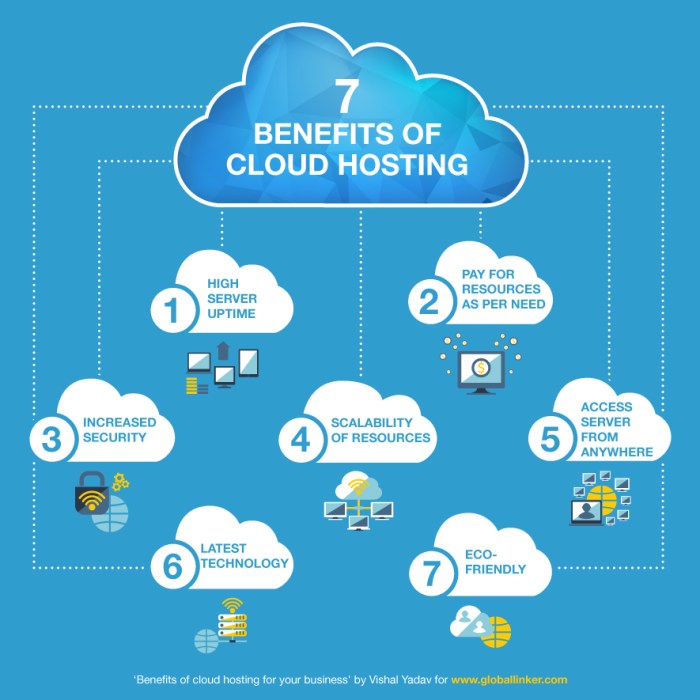Cloud hosting for developers: features and benefits – these words represent a revolution in the way we build and deploy software. Imagine a world where your applications can scale seamlessly to handle any demand, where security is a top priority, and where you can access powerful tools with just a few clicks.
This is the promise of cloud hosting, and it’s transforming the development landscape as we know it.
In this exploration, we’ll delve into the core features of cloud hosting, understand its impact on development speed and efficiency, and uncover how it empowers developers to achieve their goals faster and more effectively. From the fundamental concepts to real-world examples, we’ll navigate the exciting world of cloud hosting and discover its transformative potential.
Introduction to Cloud Hosting

Cloud hosting is a modern approach to web hosting where websites and applications are hosted on a network of remote servers instead of a single physical server. This network of servers, known as the “cloud,” is managed by a third-party provider, allowing developers to access and utilize resources on demand.Cloud hosting has become increasingly popular for developers, offering a flexible and scalable solution for managing their projects.
It eliminates the need for developers to invest in and maintain their own physical infrastructure, freeing them to focus on developing and innovating.
Popular Cloud Hosting Providers
Several major players dominate the cloud hosting market, each offering a wide range of services and features tailored to different needs. Here are some of the most popular cloud hosting providers:
- Amazon Web Services (AWS):AWS is the world’s leading cloud platform, providing a comprehensive suite of services, including compute, storage, database, networking, analytics, and more. Its vast infrastructure and global reach make it a popular choice for businesses of all sizes.
- Microsoft Azure:Azure is another major cloud platform offering a wide range of services, including virtual machines, storage, databases, and application services. Azure’s integration with Microsoft products and services makes it a good choice for businesses using Microsoft technologies.
- Google Cloud Platform (GCP):GCP is a powerful cloud platform offering a wide range of services, including compute, storage, networking, and machine learning. GCP’s focus on innovation and its advanced machine learning capabilities make it attractive to developers working on cutting-edge projects.
- DigitalOcean:DigitalOcean is a cloud hosting provider focused on providing affordable and easy-to-use services for developers. Its simple interface and comprehensive documentation make it a popular choice for individuals and small teams.
- Linode:Linode is a cloud hosting provider known for its high-performance servers and affordable pricing. Its focus on reliability and performance makes it a good choice for developers who need robust and scalable infrastructure.
Benefits of Cloud Hosting for Developers
Cloud hosting offers several advantages for developers compared to traditional hosting, making it a preferred choice for many projects.
- Scalability:Cloud hosting allows developers to easily scale their applications up or down based on demand. This flexibility is crucial for applications experiencing fluctuating traffic or growth, ensuring resources are always available when needed. For example, a developer can easily increase the processing power or storage capacity of their application during peak usage hours and then scale it back down during off-peak hours, optimizing resource utilization and reducing costs.
- Cost-effectiveness:Cloud hosting can be more cost-effective than traditional hosting, especially for small and medium-sized businesses. Developers only pay for the resources they use, eliminating the need for upfront investments in hardware and infrastructure. This pay-as-you-go model can significantly reduce costs, especially for projects with fluctuating resource requirements.
- Reliability:Cloud hosting providers typically offer high levels of redundancy and fault tolerance, ensuring that applications remain available even in the event of hardware failures. This reliability is crucial for businesses that rely on their applications for critical operations, minimizing downtime and ensuring business continuity.
- Flexibility:Cloud hosting offers developers a wide range of options for customizing their applications and infrastructure. Developers can choose from a variety of operating systems, programming languages, and databases, allowing them to build and deploy applications that meet their specific requirements.
For example, a developer can choose to run their application on a Linux or Windows server, depending on their needs and preferences.
- Security:Cloud hosting providers typically invest heavily in security measures, protecting applications and data from threats. They offer features like firewalls, intrusion detection systems, and data encryption, ensuring a secure environment for developers to build and deploy their applications. For example, AWS provides a comprehensive set of security services, including security monitoring, vulnerability management, and threat intelligence, ensuring the security of applications and data.
Benefits of Cloud Hosting for Developers: Cloud Hosting For Developers: Features And Benefits

Cloud hosting offers a multitude of advantages for developers, streamlining workflows and enhancing productivity. It provides a flexible and scalable infrastructure that adapts to evolving project needs, enabling faster development cycles and efficient collaboration.
Impact on Development Speed and Efficiency
Cloud hosting significantly accelerates development speed and efficiency by eliminating the need for developers to manage and maintain physical servers. Developers can focus on building applications rather than dealing with infrastructure complexities.
- Rapid Deployment:Cloud platforms allow for rapid deployment of applications, eliminating the time-consuming process of setting up and configuring physical servers. Developers can quickly deploy and test code changes, leading to faster iteration cycles.
- Scalability and Elasticity:Cloud hosting provides on-demand scalability, allowing developers to easily adjust resources based on application requirements. This eliminates the need for upfront investments in hardware and ensures that applications have the necessary resources to perform optimally.
- Cost-Effectiveness:Cloud hosting offers a pay-as-you-go pricing model, allowing developers to only pay for the resources they use. This eliminates the need for upfront investments in hardware and reduces overall development costs.
Simplifying Deployment and Collaboration
Cloud hosting simplifies deployment and collaboration among developers by providing a centralized platform for code management, version control, and continuous integration.
- Centralized Code Repository:Cloud platforms offer centralized code repositories, such as Git, enabling developers to collaborate on projects seamlessly. Developers can access the latest code versions, track changes, and resolve conflicts easily.
- Automated Deployment Pipelines:Cloud platforms support automated deployment pipelines, streamlining the process of deploying applications. Developers can configure pipelines to automatically build, test, and deploy code changes, reducing manual effort and minimizing errors.
- Collaboration Tools:Cloud platforms provide collaboration tools, such as chat, video conferencing, and project management software, enabling developers to communicate and work together effectively.
Facilitating Continuous Integration and Continuous Delivery (CI/CD)
Cloud hosting facilitates the adoption of CI/CD practices, enabling developers to automate the software development lifecycle and deliver applications faster.
- Automated Testing:Cloud platforms support automated testing frameworks, allowing developers to run tests automatically with every code change. This ensures that code quality is maintained and bugs are detected early in the development cycle.
- Continuous Integration:Cloud platforms enable continuous integration by automatically merging code changes into a shared repository. This ensures that code changes are integrated frequently, reducing the risk of conflicts and improving code quality.
- Continuous Delivery:Cloud platforms support continuous delivery by automating the process of deploying applications to production environments. This enables developers to deliver new features and bug fixes to users quickly and efficiently.
Choosing the Right Cloud Hosting Provider

Choosing the right cloud hosting provider is crucial for developers, as it directly impacts the performance, scalability, and security of their applications. The selection process requires careful consideration of various factors to ensure the chosen provider aligns with project needs and long-term goals.
Evaluating Pricing Models and Plans
Pricing is a primary consideration when choosing a cloud hosting provider. Different providers offer various pricing models, such as pay-as-you-go, fixed monthly fees, and tiered plans. It’s important to understand the pricing structure, including potential hidden costs or limitations, to make informed decisions.
For example, some providers may charge for data transfer, storage, or specific features. It’s recommended to analyze pricing plans from different providers, compare features, and select the option that best suits the project budget and expected usage.
Understanding Support Options and Response Times
Reliable support is crucial for developers, especially when facing technical issues or needing assistance with configurations. Evaluating the support options provided by different cloud hosting providers is essential. Factors to consider include:
- Availability of 24/7 support
- Response times for support tickets or inquiries
- Multiple support channels, such as live chat, email, and phone
- Availability of documentation, tutorials, and community forums
It’s advisable to test the support system by submitting a simple inquiry or request and assess the responsiveness and helpfulness of the support team.
Analyzing Features and Functionality
Cloud hosting providers offer a range of features that cater to different needs and project requirements. Some key features to consider include:
- Scalability:The ability to easily scale resources up or down based on application demand.
- Security:Robust security measures, such as firewalls, intrusion detection systems, and data encryption.
- Monitoring and Analytics:Tools for monitoring performance, identifying bottlenecks, and gaining insights into application usage.
- Integration with Development Tools:Compatibility with popular development tools, frameworks, and languages.
- Backup and Disaster Recovery:Regular backups and disaster recovery plans to protect data and ensure business continuity.
Assessing Reliability and Security
Reliability and security are paramount for developers, as they directly impact the stability and integrity of their applications. To evaluate the reliability and security of cloud hosting providers, consider these factors:
- Service Level Agreements (SLAs):SLAs Artikel the provider’s commitment to uptime, performance, and response times. Look for providers with high uptime guarantees and robust SLAs.
- Data Center Locations:Choosing a provider with data centers located in regions close to the target audience can improve latency and performance.
- Security Certifications:Providers with industry-recognized security certifications, such as ISO 27001 or SOC 2, demonstrate their commitment to security best practices.
- Security Features:Assess the security features offered, such as firewalls, intrusion detection systems, and data encryption. Providers should offer comprehensive security measures to protect data and applications from unauthorized access and cyber threats.
Decision-Making Flowchart, Cloud hosting for developers: features and benefits
The following flowchart Artikels a structured decision-making process for choosing the right cloud hosting provider:
[Flowchart depicting the decision-making process for choosing a cloud hosting provider. The flowchart should include steps such as:
- Define project requirements
- Research and compare providers
- Evaluate pricing and support options
- Assess features and functionality
- Analyze reliability and security
- Select the best provider based on the evaluation]
This flowchart provides a framework for systematically evaluating potential cloud hosting providers and making an informed decision.
The Future of Cloud Hosting for Developers

The cloud hosting landscape is constantly evolving, driven by advancements in technology and changing developer needs. Emerging trends like serverless computing and edge computing are poised to revolutionize the way developers build and deploy applications.
Serverless Computing
Serverless computing is a cloud-based execution environment where developers can run code without managing servers. This approach allows developers to focus on building applications without worrying about infrastructure management. The benefits of serverless computing for developers include:
- Reduced Operational Overhead:Developers can focus on building applications without managing servers, operating systems, or infrastructure. This frees up time and resources for innovation.
- Increased Scalability:Serverless platforms automatically scale resources based on demand, ensuring applications can handle traffic spikes without performance degradation.
- Cost Optimization:Developers only pay for the resources they consume, making serverless computing a cost-effective solution for applications with fluctuating workloads.
Serverless computing is well-suited for applications with short-lived tasks, event-driven architectures, and microservices. Examples of serverless platforms include AWS Lambda, Azure Functions, and Google Cloud Functions.
Edge Computing
Edge computing brings computation and data storage closer to users, reducing latency and improving application performance. This approach is particularly beneficial for applications that require real-time data processing, such as IoT devices, gaming, and streaming services. Edge computing offers several advantages for developers:
- Reduced Latency:By processing data closer to users, edge computing minimizes latency, improving user experience and enabling real-time interactions.
- Improved Performance:Edge computing reduces network traffic and bandwidth consumption, resulting in faster application response times and better performance.
- Enhanced Security:Edge computing can improve security by processing sensitive data locally, reducing the risk of data breaches and security vulnerabilities.
Edge computing is expected to play a significant role in the future of cloud hosting, enabling developers to build applications that deliver a more responsive and secure user experience.
Conclusion
As we conclude our journey through the realm of cloud hosting for developers, it’s clear that this technology is not just a trend; it’s a fundamental shift in the way we approach software development. By embracing the power of scalability, reliability, and security, developers are empowered to create innovative solutions that shape the future.
As cloud hosting continues to evolve, its impact on the development landscape will only grow stronger, unlocking new possibilities and driving progress in the digital world.
